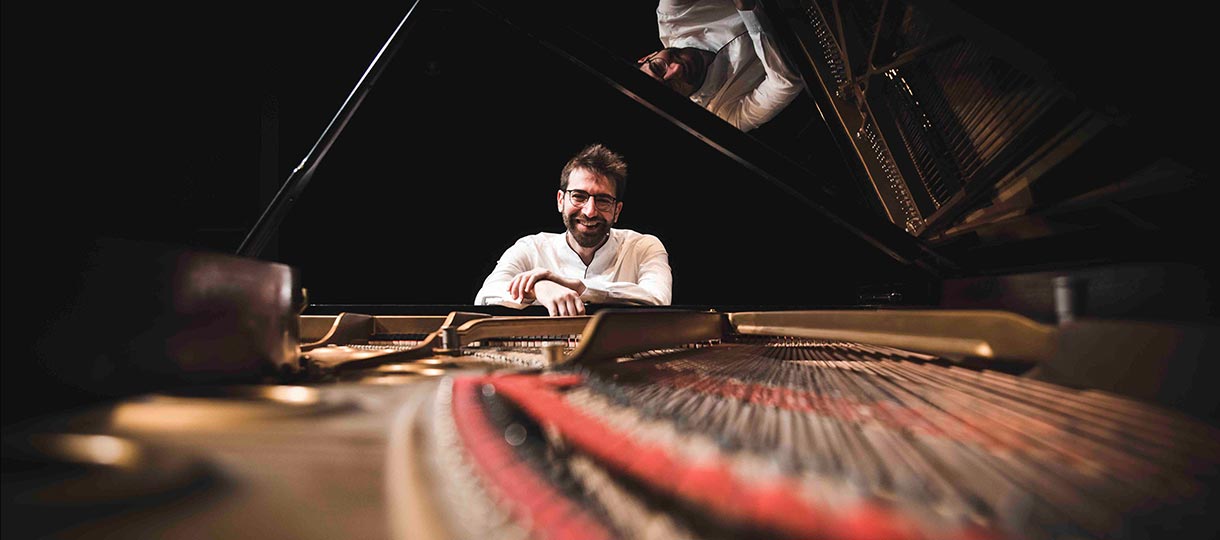Gabriele Carcano was born in Torino in1985 and is one of the best-known Italian pianists of his generation. Winner of major competitions, he now has an international career as a concert pianist and performs in prestigious concert series and auditoriums around the world: from the Tonhalle in Zurich to the Salle Pleyel in Paris, from the Musashino Hall in Tokyo to the Accademia di Santa Cecilia in Roma. The orchestras he has performed with include the Orchestre National de Montpellier, the Staatskapelle Weimar and the Orchestra da Camera di Mantova. An outstanding performer in chamber music ensembles, he plays regularly with Stephen Waarts, Lorenza Borrani, Enrico Dindo, Sergej Krylov, Marie-Elisabeth Hecker, Quartetto Hermes, Danilo Rossi and Viviane Hagner.
At the Accademia di Musica, Gabriele Carcano has taught advanced courses in piano since 2015, as well as holding masterclasses during the Musica d’Estate summer campus. As part of our section A Career in Music, we interviewed him to ask what advice he would give to our students, who are set to become the future generation of music professionals.
What were the key experiences that marked your development and training as a musician? At what time of your life did they take place? Why were they significant?
We have to start from the premise that the path of every musician is personal and therefore very difficult to compare with anyone else’s, since there is no set of predetermined steps to be followed that will work for everyone. For example, not coming from a family of musicians, it was some time before I began to work with and learn from musicians and teachers at the highest levels. So becoming a student of Andrea Lucchesini and of Aldo Ciccolini were two very important moments in my training as a musician, as was going to live abroad and taking part in a number of the annual Marlboro Music Festivals. If I had to say what these experiences had in common, they were all important opportunities for learning and understanding. But sometimes a concert that you hear, a book you read, an exchange of ideas with another musician can also be important learning experiences. This is why I believe it is important that we are not just “pianists” but musicians and human beings, in the widest and most inclusive sense.
Can you describe one or two turning points in your career? What impact did they have on your career? Why were they important?
I’ve entered very few competitions, so my turning points were not linked to winning prizes. If I had to choose two key moments, I would say, firstly, meeting with agents and artistic directors during a Cidim concert series. I was playing in, which enabled me to make my first professional contact with the world of concerts. And then, similarly, my contact with the Borletti-Buitoni Trust, who provided me with more contacts outside Italy and opportunities to meet many brilliant musicians, as well as giving me the incentive to concentrate on my personal projects.

Often our mistakes teach us important lessons. If you could go back in time in your career what would you do differently?
Everything and nothing. When do you ever look back and say: “That was perfect”? Personally, I always find something that I would have liked to have done better or differently. I wish I had studied better, played better, chosen better, listened more to a piece of advice I was given, had not neglected this or the other thing. Nevertheless, I really wouldn’t change very much because I only know the present version of myself, which is the result of those choices, wrong or right as they may have been. Of course, there are things I wish I had done differently, but if I had, would the result necessarily have been better? It is essential to look back over the past, but at the same time we tend to forget that what we knew at that time was not what we know today. If taken to an extreme, analysing moments in the past in the light of our current knowledge can actually be harmful. If mistakes are great lessons, can we really still consider them mistakes? Learning to accept that some things don’t depend entirely on you is another great lesson: more important than not making mistakes is to make them in good faith, always trying to follow the path that you believe is the right one for you. Perfection doesn’t exist: it’s an illusion.
Along a musician’s career path there are always many important decisions to be made and these often depend on and result from the opportunities that are offered to them. What helped you to stay focused and not to lose sight of your goals?
In many cases, it has been absolutely crucial for me to have had (and to have still today) people around me whom I respect and trust, and to be able to ask them for advice.. That doesn’t mean that I haven’t had moments of great confusion, when I felt that I had lost my way, but these are all part of the growth and development of an artist and I don’t believe that in themselves they are a problem. They are not easy to overcome, but they help you to get to know yourself. Often, “losing your way” means shaking off the image you have had of yourself, or that others expect from you: this process can be painful but it is important if you are to find yourself as a person and as a musician. Once again, it is important to have an awareness of the general direction you are heading in. You have to find a happy balance between having trust in yourself, and in others who you believe really understand you. Trust in your deepest instincts but also keep a measure of lighthearted optimism.
Apart from studying with great passion and dedication, what advice would you give to young musicians who are starting out on a career in music?
Summing up my answers, which seem perhaps a little unusual, in my opinion one thing is paramount: you need to have a long-term vision of your life and of your identity as a musician. You must find and listen to your inner voice and to trust in that and in your work: these will be your only real support and guide along your path as you meet with difficulties, sacrifices and errors, but also with success, fulfilment etc. I believe this is true, no matter what form your life as a musician takes, whether it be performing in concerts, teaching or any other activity. How we express our identity as musicians can be determined by many things; however, what we want to communicate and to be comes before the “how”, and is more important. I also advise you to trust your teachers (if they have been chosen according to the criteria of honesty and if you feel that they respect and understand you), because they are (we are) here primarily to try to help you.
__________________
